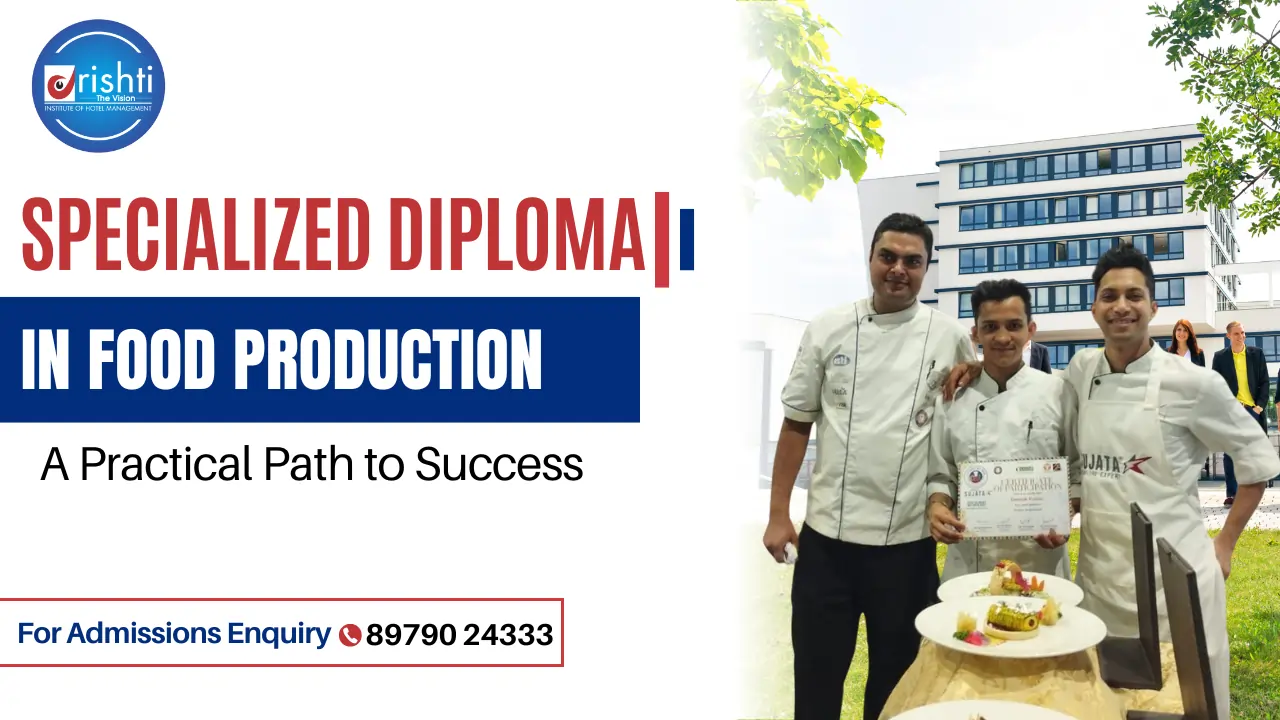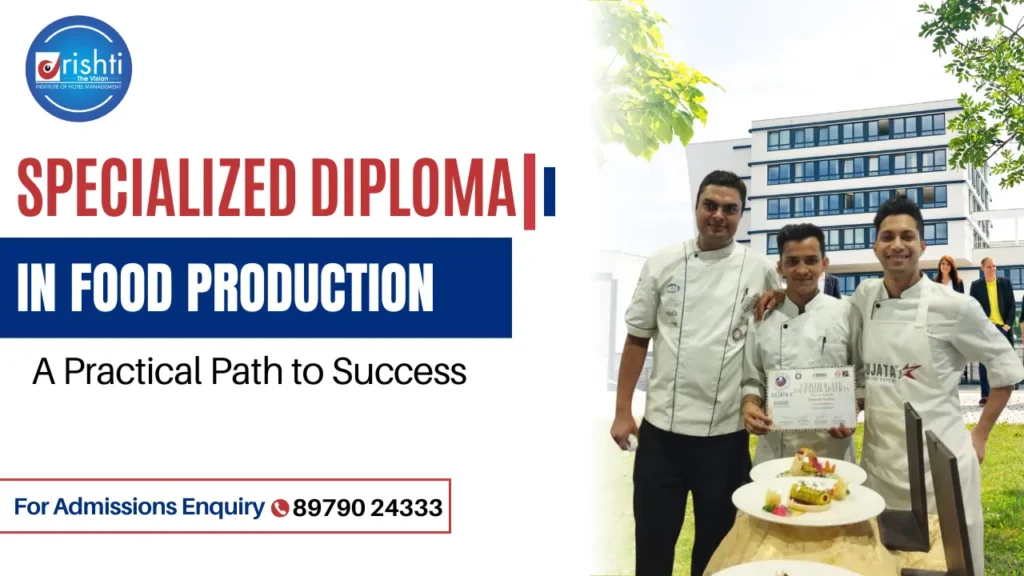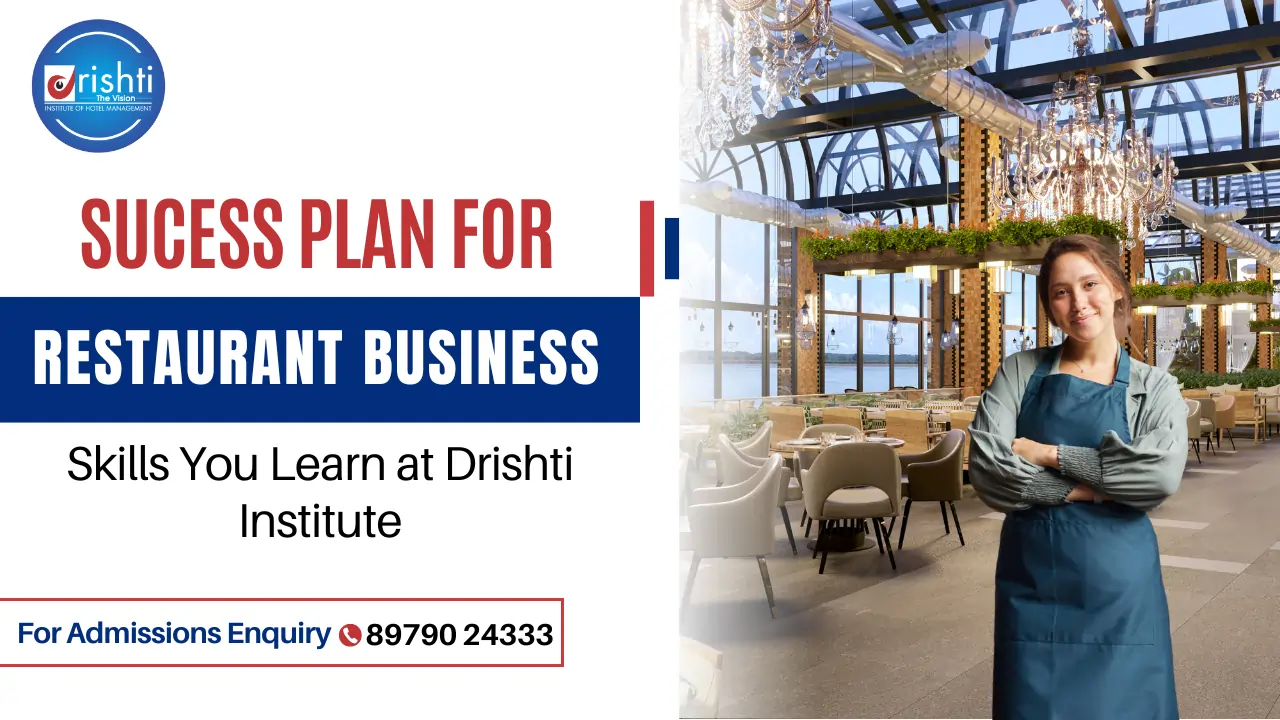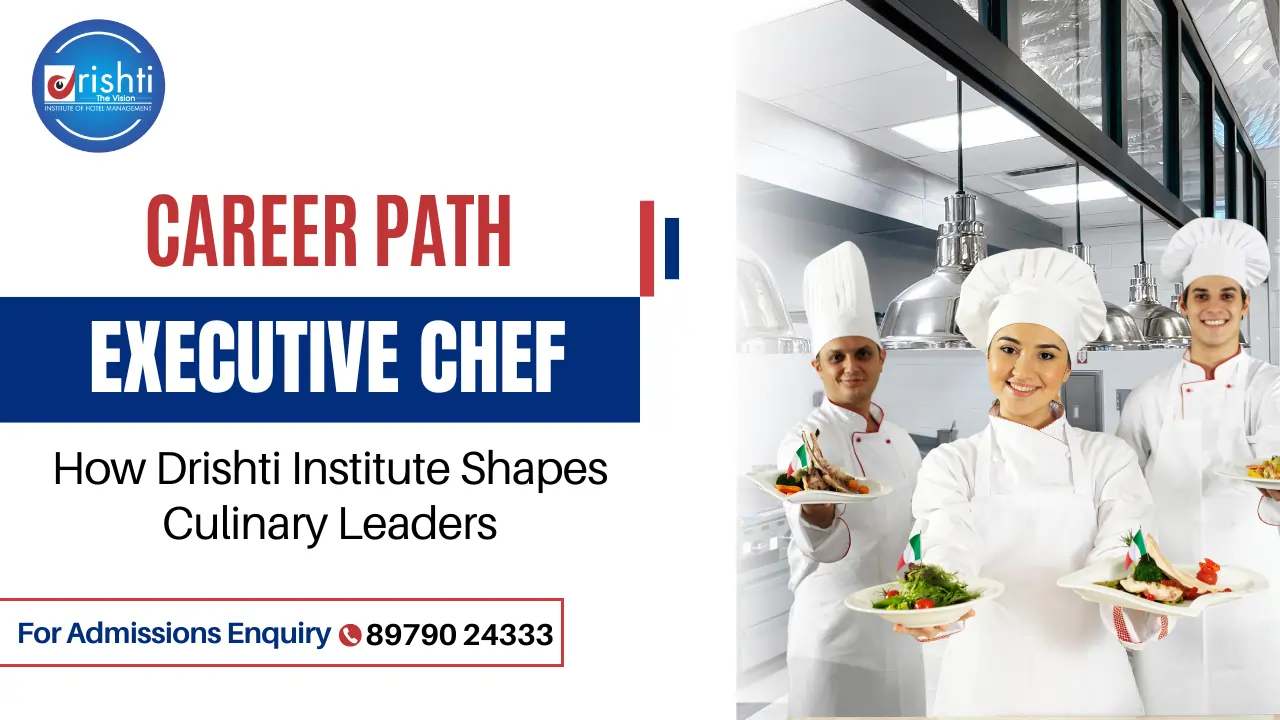
Are you passionate about cooking and dream of building a career in the culinary world? Choosing the right course and institute can be overwhelming, especially when you want a program that combines hands-on training with real-world experience. If you’re based in or near Haldwani, finding the best hotel management institute is crucial to achieving your goals. Here’s how this article will help you:
- Learn why a Specialized Diploma in Food Production is the perfect choice for aspiring culinary professionals.
- Discover how studying at the best hotel management institute in Haldwani, like Drishti Institute, provides practical learning, industry exposure, and career-focused education.
- Find out how this diploma equips you with essential skills like professional cooking techniques, kitchen management, and food safety standards.
Whether you aspire to be a chef, food entrepreneur, or kitchen manager, this guide will provide actionable insights to help you make informed decisions and take the first step toward your culinary dreams.
Table of Contents
What is a Specialized Diploma in Food Production?
A Specialized Diploma in Food Production is a professional program designed to equip students with the skills, knowledge, and practical experience required to excel in the culinary arts and food production industry. This diploma focuses on both the art and science of cooking, covering everything from basic culinary techniques to advanced kitchen management and food safety practices. It is an ideal choice for individuals passionate about cooking and looking to build a career in the food service or hospitality industry.
Overview of the Program and Its Focus on Culinary Arts
The diploma program is structured to provide a comprehensive understanding of food production processes while emphasizing hands-on training. Here’s what the program typically includes:
| Core Curriculum | Description |
|---|---|
| Basic Culinary Skills | Introduction to kitchen operations, knife skills, food handling, and hygiene practices. |
| Cooking Techniques | Training in methods like grilling, baking, steaming for cuisines such as Indian, Asian, and Western. |
| Menu Planning and Costing | Designing menus based on customer preferences, nutritional needs, and cost control strategies. |
| Food Safety and Sanitation | Learning HACCP standards and best practices for maintaining hygiene in kitchen environments. |
| Kitchen Management | Understanding workflow management, inventory control, and staff supervision in professional kitchens. |
| Hands-On Training | Description |
|---|---|
| Practical Sessions | Conducted in state-of-the-art kitchens where students prepare dishes under expert supervision. |
| Internships | Real-world experience gained by working with hotels, restaurants, or catering companies. |
| Duration | Description |
|---|---|
| 12 to 18 Months | Program includes classroom learning combined with practical training or internships. |
- Core Curriculum:
- Basic Culinary Skills: Introduction to kitchen operations, knife skills, food handling, and hygiene practices.
- Cooking Techniques: Training in various cooking methods (e.g., grilling, baking, steaming) for different cuisines like Indian, Asian, Mediterranean, and Western.
- Menu Planning and Costing: Designing menus based on customer preferences, nutritional needs, and cost control strategies.
- Food Safety and Sanitation: Learning HACCP standards and best practices for maintaining hygiene in kitchen environments.
- Kitchen Management: Understanding workflow management, inventory control, and staff supervision in professional kitchens.
- Hands-On Training:
- Practical sessions in state-of-the-art kitchens where students prepare dishes under expert supervision.
- Internships with hotels, restaurants, or catering companies to gain real-world experience.
- Duration:
- The program typically lasts between 12 to 18 months, depending on the institute. It includes classroom learning combined with practical training or internships.
This focus on practical learning ensures that students are well-prepared to meet the demands of the fast-paced culinary industry.

Importance of Food Production Education for Career Growth
The food production industry is a cornerstone of the hospitality sector, offering numerous career opportunities. Pursuing formal education in this field provides several advantages:
- Skill Development:
- Students master essential culinary skills such as knife handling, food preparation techniques, and plating aesthetics.
- They also learn ancillary skills like budgeting, menu planning, and team management.
- Industry-Relevant Knowledge:
- The curriculum is designed to align with current industry trends, ensuring graduates are well-versed in modern cooking techniques and kitchen technologies.
- Career Advancement:
- A diploma in food production opens doors to various roles such as chef, kitchen manager, or catering supervisor.
- Graduates often start at higher-paying positions compared to those without formal training.
- Global Opportunities:
- The culinary field offers international career prospects as chefs are in demand worldwide.
- Specialized training in global cuisines enhances employability across borders.
- Entrepreneurial Pathways:
- With knowledge of kitchen operations and menu planning, graduates can start their own ventures like restaurants, bakeries, or catering businesses.
- Creative Expression:
- Food production allows individuals to express their creativity through innovative recipes and artistic plating techniques.
By providing both technical expertise and creative freedom, a diploma in food production serves as a solid foundation for long-term career success.
How It Differs from Other Hospitality or Culinary Programs
While food production is a subset of hospitality education, it has distinct differences from broader hospitality or culinary arts programs:
| Aspect | Specialized Diploma in Food Production | Culinary Arts Programs | Hospitality Management Programs |
|---|---|---|---|
| Focus | Emphasizes cooking techniques, kitchen management, food safety | Focuses on artistic aspects like plating & recipe creation | Covers broader topics like front office & housekeeping |
| Curriculum | Includes food preparation techniques & menu planning | Includes baking & pastry arts alongside cooking | Covers hotel operations & customer service |
| Practical Training | Extensive hands-on training in kitchens | Hands-on training with emphasis on creativity | Limited focus on food production |
| Career Pathways | Chef roles (e.g., commis chef), catering manager | Pastry chef, culinary consultant | Hotel manager, event planner |
| Duration | Shorter (12–18 months) | Varies (6 months–4 years) | Typically 3–4 years |
A specialized diploma focuses specifically on equipping students with the technical skills required for professional kitchens rather than broader hospitality or artistic culinary skills.
Benefits of Pursuing a Diploma in Food Production
A Specialized Diploma in Food Production offers numerous advantages for aspiring culinary professionals, combining creative opportunities with practical skills development.
Creative Development
- Master the art of menu planning and innovative food presentation techniques that transform ordinary dishes into culinary masterpieces.
- Learn to experiment with different textures, combining crunchy and creamy elements to create exciting dining experiences.
- Develop artistic plating skills using sauce art, food brushstrokes, and creative shape arrangements.
Technical Expertise
- Gain comprehensive knowledge in essential culinary techniques, including:
- Professional cooking methods
- Specialized baking skills
- Food production techniques
- Nutrition and dietetics knowledge
Career Growth Opportunities
- Access diverse career paths across multiple sectors:
- Hotels and restaurants
- Catering services
- Airlines and cruise ships
- Healthcare facilities
- Educational institutions

Professional Development
- Build transferable skills that remain valuable throughout your career.
- Learn kitchen management and workflow optimization techniques.
- Develop expertise in food safety and hygiene practices.
Financial Benefits
- Enjoy competitive salaries and attractive compensation packages.
- Access opportunities for continuous growth and advancement into specialized roles.
- Gain the skills needed to pursue entrepreneurial ventures in the food industry.
Industry Recognition
- Receive formal qualification recognized by the hospitality industry.
- Build professional networks through internships and industry exposure.
- Gain practical experience in real-world culinary environments.
This diploma not only equips you with technical skills but also provides a platform for creative expression and long-term career growth in the dynamic food industry.
Career Opportunities After Completing a Diploma in Food Production
A Diploma in Food Production equips graduates with the skills and knowledge to pursue a wide range of exciting career opportunities in the culinary and food service industries. From working as chefs in prestigious establishments to starting entrepreneurial ventures, this diploma opens doors to diverse roles with significant growth potential. Below is an expanded overview of the career paths, entrepreneurial opportunities, salary expectations, and growth prospects.
1. Career Roles in Food Production
Graduates can explore various roles across the culinary and hospitality sectors. Some of the most prominent roles include:
Chef (Commis Chef, Sous Chef, Pastry Chef)
- Responsibilities:
- Preparing and presenting dishes with precision and creativity.
- Specializing in cuisines such as Continental, Indian, Chinese, or pastry arts.
- Managing kitchen operations and ensuring food quality.
- Salary:
- Entry-level (Commis Chef): ₹2.5–4 LPA.
- Mid-level (Sous Chef): ₹4–7 LPA.
- Senior-level (Executive Chef): ₹7–15 LPA.
Kitchen Manager
- Responsibilities:
- Overseeing kitchen operations, managing inventory, and supervising staff.
- Ensuring compliance with food safety regulations and maintaining efficiency.
- Salary:
- Entry-level: ₹3–5 LPA.
- Mid-level: ₹5–8 LPA.
- Senior-level: ₹8–12 LPA.
Catering Supervisor
- Responsibilities:
- Coordinating food production for events like weddings, conferences, and corporate gatherings.
- Managing logistics, menu planning, and team supervision to deliver exceptional dining experiences.
- Salary:
- Entry-level: ₹3–5 LPA.
- Mid-level: ₹5–7 LPA.
- Senior-level: ₹7–10 LPA.
Other Career Roles:
- Food Safety Inspector/Quality Control Supervisor: Ensures food safety standards are met in production facilities (₹3–6 LPA).
- Restaurant Manager: Oversees overall restaurant operations, including customer service and financial performance (₹3.5–8+ LPA).
- Food Product Developer: Innovates new recipes or enhances existing food products for restaurants or manufacturers (₹4–8+ LPA).
2. Opportunities for Entrepreneurship
For those with an entrepreneurial mindset, a diploma in food production provides the foundation to start their own ventures. Some entrepreneurial opportunities include:
Starting a Bakery
- Create niche offerings like gluten-free or vegan baked goods to cater to specific markets.
- Options include home-based bakeries, counter-service bakeries, or bakery cafés.
Launching a Catering Business
- Plan and execute catering services for events such as weddings or corporate functions.
- Focus on providing high-quality food presentation and exceptional service.
Opening a Restaurant or Food Truck
- Use expertise in menu planning and cooking techniques to create unique dining experiences.
- Food trucks offer flexibility by serving customers in high-demand areas.
Specialty Food Products
- Develop packaged products like sauces, desserts, or ready-to-eat meals for retail or online sales.
Entrepreneurship allows graduates to combine their culinary skills with business acumen while enjoying creative freedom and financial independence.
3. Insights into Salary Expectations
Salaries in the food production industry vary depending on factors such as job role, experience level, location (domestic vs. international), and the size of the organization. Below is an overview:
| Job Role | Entry-Level Salary (₹) | Mid-Level Salary (₹) | Senior-Level Salary (₹) |
|---|---|---|---|
| Commis Chef | 2.5–4 LPA | 4–6 LPA | N/A |
| Sous Chef | 4–7 LPA | 7–10 LPA | N/A |
| Executive Chef | N/A | 7–15 LPA | 15+ LPA |
| Kitchen Manager | 3–5 LPA | 5–8 LPA | 8–12+ LPA |
| Catering Supervisor | 3–5 LPA | 5–7 LPA | 7–10+ LPA |
| Restaurant Manager | 3.5–5 LPA | 5–8+ LPA | 8–12+ LPA |
4. Growth Potential
The culinary industry offers immense opportunities for professional advancement:
- Rapid Career Progression:- Entry-level chefs can quickly move up the ranks to become sous chefs or executive chefs by demonstrating creativity and leadership skills.
- Global Opportunities:- Culinary professionals are in demand worldwide. Specializing in international cuisines enhances employability across borders.
- Diverse Specializations:- Graduates can specialize further in areas like pastry arts, food styling, or food safety management.
- Upskilling Through Certifications:- Additional certifications like HACCP (Hazard Analysis Critical Control Point) or advanced culinary courses can open doors to senior roles with higher pay scales.
With competitive salaries and significant growth potential both domestically and internationally, a career in food production is not only rewarding but also full of exciting possibilities.
Conclusion
A Specialized Diploma in Food Production is an excellent choice for aspiring culinary professionals who are passionate about building a creative and rewarding career in the food industry. This program equips students with essential skills such as professional cooking techniques, menu planning, food safety, and kitchen management, ensuring they are job-ready for diverse roles like chefs, kitchen managers, or catering supervisors. With opportunities for entrepreneurship and significant growth potential across various sectors, this diploma serves as a strong foundation for long-term success in the culinary world.
For students looking to pursue this exciting career path, choosing the right institute is crucial. Drishti Institute, regarded as the best hotel management institute in Haldwani, offers top-notch education, hands-on training, and strong placement support to help you achieve your culinary dreams.
Take the first step toward your culinary career today! Visit Drishti Institute or contact 89790 24333 to learn more about their programs and begin your journey toward becoming a culinary expert.





